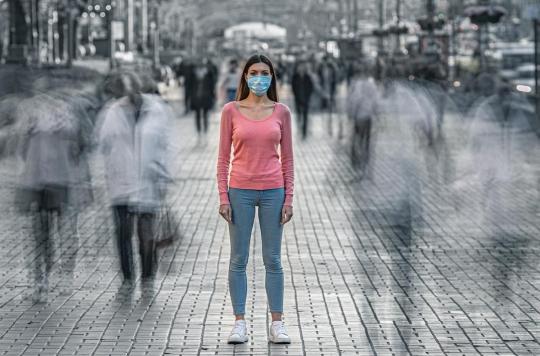Last Friday, the High Authority for Health issued recommendations for the care of patients with a long form of the disease which is not yet recognized by the government or supported by the health system. Cécilia*, 40, is one of the founders of the “Après J20” collective which carries the voice of these patients in whom the Covid does not want to leave and herself suffering from a long Covid.

Friday, February 12, the High Authority for Health (HAS) for the first time issued recommendations for the management of long Covid. In the meantime, many patients suffer from symptoms that persist and from a situation from which they sometimes do not see the outcome. This is the case of Cécilia *, 40, who will soon “celebrate” the 1 year of her Covid-19 infection.
– Why Doctor – How did you know you had a long Covid?
Cécilia* – I first fell ill in early March. It started with a very dry cough. I am usually in very good physical health, I pay attention to my diet, I am athletic, a marathon runner so I was not worried. A week later, I started having trouble breathing, like a fat man was sitting on my chest. Very quickly, it turned into respiratory distress and I had a fever of 38. When the Samu came to fetch me, I could no longer speak. The Rennes University Hospital Emergency Department kept me for a few hours and gave me tests before telling me that everything is normal, without giving me a Covid test. When I got home, I couldn’t eat anymore, I had stomach problems. I lost 10 pounds in a month, lost all my muscles and continued to have trouble breathing with wheezing. I had another relapse two days later with another respiratory attack. At that time, I was bedridden.
At the end of April, I wasn’t much better. My general practitioner, who followed me a lot, spotted signs of pulmonary embolism. I was admitted to a Covid unit where I had a chest scan which revealed nothing. I spent the night in the hospital where I was told that cases like mine were starting to appear.
At the beginning of May, I was better and I was able to resume working remotely. After 10 days, I had an inflammatory attack, ants in my limbs, I couldn’t stand my legs anymore, I suffered from joint pain from not being able to walk and burning in both joints and skin. I suffered from all this for several days. They no longer knew what to do with me and they prescribed me antidepressants without my understanding why. I was told it was in my head. I then had an appointment with an internist who started to take an interest in long Covids and who noticed that my situation was not normal. She noticed that I had an immune imbalance caused by the Covid, an inflammatory problem and asthma.
At the end of September, after a few relapses during the summer, things were going a little better but I am very far from having regained my form before. In November I had an operation for another problem and then had a big relapse for a month. Since December, I have oscillated between less good and better. I have less big relapses but I lost my job because of my situation.
– From when is one considered to have a long Covid?
In general, if after four weeks the severe symptoms persist and there are relapses, the risks are great. From the identification of the symptoms and their duration beyond these four weeks, one can think of a long Covid. Afterwards, in long Covids there are more or less long Covids. Only 10% of them are not cured after 6 months. I’m part of. But even in some patients who are cured, there are remnants that are not severe or disabling.
– What changes on a daily basis?
Today, while I’m a little better, I’m still very tired. I can’t predict many things. Last Wednesday, the weather was nice so I went out with my daughter. The next day I was very tired. You have to know how to manage your fatigue. I, who am very sporty, can no longer run or play sports. I only do rehabilitation. Yesterday morning I did 15 minutes on the elliptical trainer. Last night, I had a respiratory attack, I had trouble speaking, I had no voice and chest pain. I can’t really play with my daughter anymore. After lunch I have to take a 20 minute nap. I also have my eyesight which has deteriorated and I now have to wear glasses.
– Are you supported?
I am followed by many doctors from several disciplines. I consult a specialist in internal medicine, a pulmonologist, I have two sessions with a respiratory physiotherapist, I see a mobility physiotherapist, a dermatologist for skin problems and I do speech therapist rehabilitation. But all that is not done in the same place, there is no general follow-up. Plus, it’s all very expensive.
– How was born the association “After D20”?
It all started with discussions on social networks from April. Many of us noticed that we had specific symptoms and similar pain. We spoke with international associations, in particular Long Covid in England, which were quicker than us to recognize and take care of long Covids. We said to ourselves that we had to be recognized in France. We formed a collective in June/July. Some medical decisions then surprised us a lot with regard to our situations. We also had a lot of reactions to our testimonies to call us crazy. At the end of August, we managed to be invited to a videoconference of the World Health Organization (WHO) during which it recognized the long Covid. We transformed the collective into an association on October 16th.
– What are the objectives of the association?
Our goal is to make the disease heard. We want it to be officially recognized by the government. We are interviewed tomorrow (the interview was conducted on Monday, February 15) at the office of the Ministry of Health. We also want there to be multidisciplinary patient care. At the national level, nothing exists apart from the Hôtel Dieu in Paris and the Foch Hospital in Suresnes or even the Pitié-Salpêtrière, but the situation is beginning to change. Last Friday, the HAS published a long Covid management guide for which we collaborated for more than a month. We also want to help with research and we would like to raise funds. We want to set up a multidisciplinary course that offers treatments according to the patient’s long Covid table. What is needed is to have a patient orientation. Today, it is the attending physicians who have played this role a great deal.
* : alias.

.















